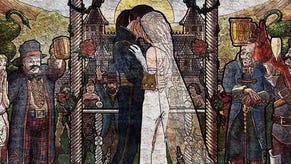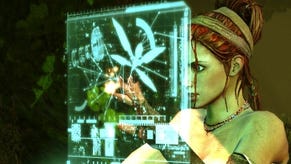Black & White 2
Disappointment in liquid form. Except, a computer game instead of liquid.
I've been God for quite a while now. It began back in the 80s, and I've been filling the role ever since. Funny thing - I'm used to it. It was special at first - I had the power to raise and lower the ground itself, change the weather, summon forth great changes to the world, and most of all, influence the lives of my subjects to my whim. Meh, that's old news now. Being God is good, yes, and I'm not trying to suggest otherwise. All I'm saying is, I'm past the point where being reminded of my abilities is enough to get me going.
The trouble is, Black & White 2 seems to think otherwise. From the moment you begin, it's unavoidably obvious that Lionhead think you're going to be wowed by the deified position they've put you in, and hope that's enough to blind you to the mediocre game beneath.
Immediately it's beautiful. Gorgeous islands are flown around, detailed to the finest blades of grass, all alive and aware of your godly presence. Sweep your cursor hand across the vegetation and it sways beneath your awesome power. Trees bow their boughs as you stroke them, vast boulders crack in half at your touch. Animals shiver sensing that their creator is amongst them, the sea ripples under your palm. You really are the god of this land. The lavish animations create a living, wonderful world into which you're tasked to impose your kingdom. If only there was five minutes to look at it without the bloody imps springing up and shouting their dreadful script at you.
Beginning at the beginning. Black & White 2 claimed it would not repeat the nightmarish obligatory tutorial of the original. And indeed, at the very beginning you are offered the opportunity to skip the basic movement instructions, should you have remembered them from before. However, if you fancy a refresher, then nothing has changed - rather than briefly explaining that right clicking the ground grabs it, and then moving the mouse pulls you in that direction, it instead forces you to sit through an agonisingly idiotic step-by-step guide, requiring that you learn not only how to move to the left, but also, wait for it, how to move to the right. Anyone who would need such ludicrously slow and patronising guidance would not have been able to manoeuvre the disc into the drive to install the game, let alone put their own trousers on.
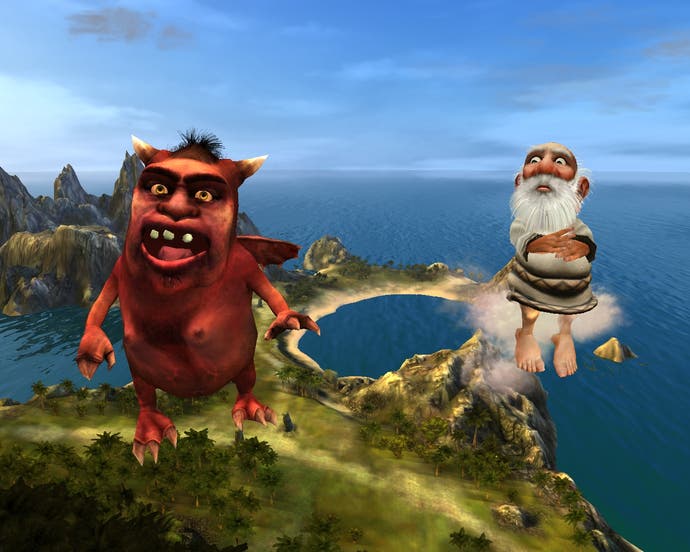
But this is skippable - stop complaining reviewing man. And indeed it is. But unfortunately the tutoring doesn't end there. It continues to explain (almost) every detail of the game in interrupting routines where the impish angel and demon appear for their oh-so hilarious bantering argument-driven explanations. (Hint to those with both their legs in one leg of their trousers - there is some irony in that sentence). Don't complete their task, and they'll shout at you until you bloody well do. Even more unfortunately, not only does the tutoring not end there, but indeed seemingly doesn't end... ever. If it really were possible to skip B&W2's tutorial, you would be immediately facing closing credits. Tutorial: The Game. Presumably intended as your 'guides', the comedyless double-act of floating imps persist in screaming instructions at you no matter how far through the proceeding you persist.
Those sporting a fully zipped and buttoned pair of trousers will have noticed the parentheses "almost" in the previous paragraph. Good work, dressed ones. It exists to ensure that you are warned about how this incessantly fussy game is not nearly as comprehensive as it might appear. Despite telling you in intricate detail how food stores are used for storing food, and that casting water miracles casts miraculous water, it entirely fails to explain vital tactical information, such as how the people of your towns are too stupid to know how to open their own town gate when ordered to leave the walled enclosures, rather relying on their father in heaven to be on door monitor duty. Indeed, the supposedly sentient inhabitants of your towns rely on you for an astonishing number of menial tasks, from giving them permission to breed when they want children, to whether they want to worship you or not. This complete lack of autonomy on their part leaves you not feeling like their god, but their babysitter.
All this negativity! All this anger! It's a Lionhead game - that's like being a Bullfrog game! You've obviously already scrolled to the bottom and seen the score, you already know it's not a complete disaster. So why so cross, Mr Grumpy? Because this is a game that should have been a 9. It could have contended for 10. Expectation doesn't mean that B&W2 gets a rougher treatment. But it does mean it's the job of the review to explain why it didn't live up to it.
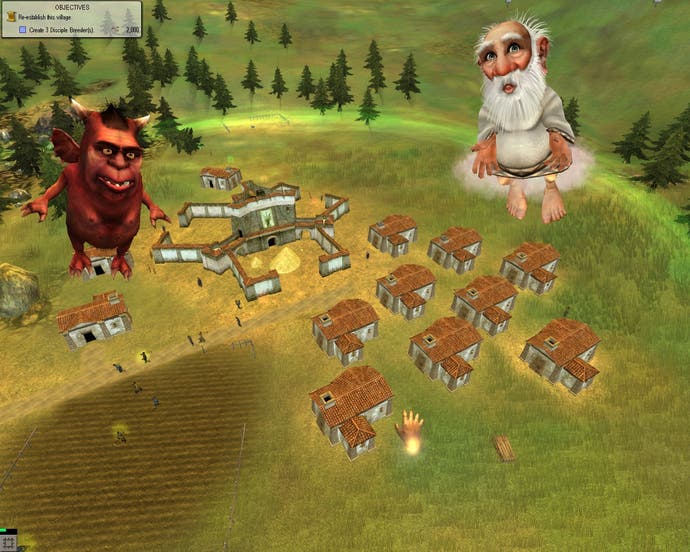
Perhaps we're rushing ahead. Black & White 2, much like the original, charges you with the job of building towns and cities on small islands, with a view to either wowing the locals so much they want to join you, or defeating them in battle to secure their towns as your own. There's a vague story to justify all this, casting you as the Greeks, attempting to form allegiances with various nations in order to win the ultimate battle with the rival Aztecs. Helping you to achieve this is your representative on earth, your Creature. Chosen from either a lion, monkey, wolf or cow, your Creature begins as a baby, and grows up throughout the course of your adventures. The original Black & White relied on the creature for its brief success - at a time when Tamagotchi was the closest you could get to raising your own digital beast, finding yourself interacting with a playful, naive and gleefully eager to please little pet was a joy. A joy made complete when you realised you could influence his behaviour by how you responded to his actions, and teach him through demonstration. In a parody of parenthood, your influence dictated the sort of personality your Creature possessed, his inclination to be good or bad, his predilection to work or play. Well, that was the idea. For a few levels it felt as though it was working, and Black & White seemed like one of the greatest games of all time. About halfway through, the lie broke down and revealed itself, your Creature's AI admitted its failure, and all but the most pointlessly determined found themselves and their Creature lapsing into Evil no matter how hard they fought to be good.
So in the last seven million years since the first game, the obvious thing to do would be to get all that stuff fixed, and release the game done proper. Which makes it an odd decision by Lionhead to choose to strip out almost all that made it interesting, and put its effort into making everything look very pretty, and implement an entirely broken combat system. There are some important improvements to the Creature. If we forget the astonishingly evocative animations it possesses (because so will you once that pleasant novelty quickly wears off), it does now appear to remember what you've told it. When he ponders eating a villager (now demonstrated through written thoughts in think bubbles above his head), and you slap him with your godly hand until he's well and truly sorry, he will think twice about doing that again. Congratulate him with attentive strokes and belly-rubs when he helps the townspeople build their homes, and he'll seek out to please you with that task in future. As nice as this sounds, it does become obvious pretty quickly that what's actually happening here is you're flicking a switch to either 'on' or 'off'. Don't want him pooing in the food store? Then slap him until that AI option is 'off'. Want him to eat innocent children? Then pat him on the head once he's filled his tummy, and the switch is set to 'on'.
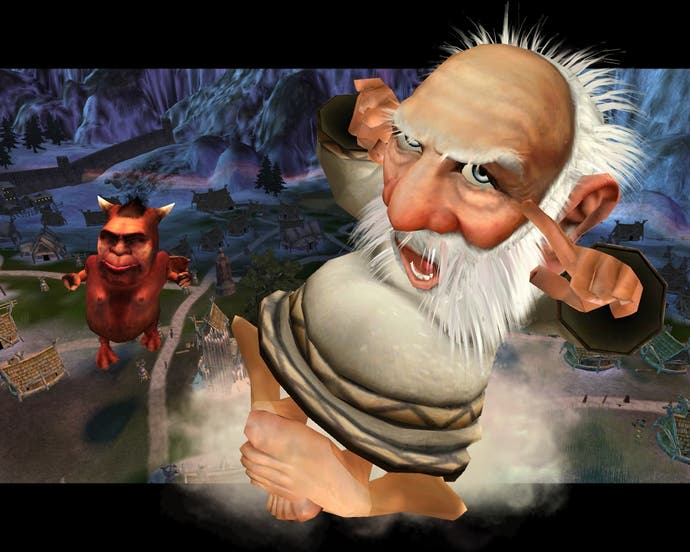
What's far more disappointing is the complete abandoning of the (admittedly completely broken) teaching system from before. In theory, if you put your Creature on his leash and cast a few fireballs here and there, your Creature would learn from you and attempt to do the same. Now, in a hollow and emotionless design, you buy abilities for your beast from a long, long list of options with the ''tribute' you've earned through play. This is the same way you obtain new buildings for your towns - rather than unlocking new and more advanced features by playing well, you're given everything that the game has to offer from the start, so long as you possess enough tribute to purchase it. Why you want to purchase any of it is another missing feature from the endless tutorial. Certainly they tell you that you can buy them, that variety will please your peoples, and each new building or decoration comes with a description detailing how much more impressive it will make your town. But beyond that, do you actually need a rest home? Does improving the lives of the elderly make a difference to your game? Definitely not in any way that will change your experience.
Tribute is earned through completing the string of tasks silently appointed at the start of each new island. With no ceremony or connection to the story arc, a vast array of what are best described as chores, are given. These vary from the obligatory: take over the island; the vaguely interesting: build a wonder, take over three towns without force; and then in huge numbers the worryingly tedious: deforest the land, build eight fields, collect 8000 ore, make 20 breeders... To understand quite how laborious and un-game-like these are, know that creating a breeder entails picking up a person, and dropping them near another person. Collecting ore involves dropping people near the ore mine. Over and over. And over. That these challenges are so lacking in imagination is an indication of quite how limited B&W2 is. It wouldn't have been possible for Lionhead to come up with more creative tasks, because B&W2 possesses nothing to support such creativity.
The other means of gaining credit is by completing the silver-scroll tasks. These are essentially mini-games scattered about islands, available to play at any time whether you've conquered their location or not. If you played the original, think the singing sailors and their request. And if you're curling up in pain at that memory, stay there. These micro-missions are so wantonly pedestrian as to be an insult. Lionhead clearly couldn't care less about these, dumping in the most obvious and cumbersome time-fillers possible.
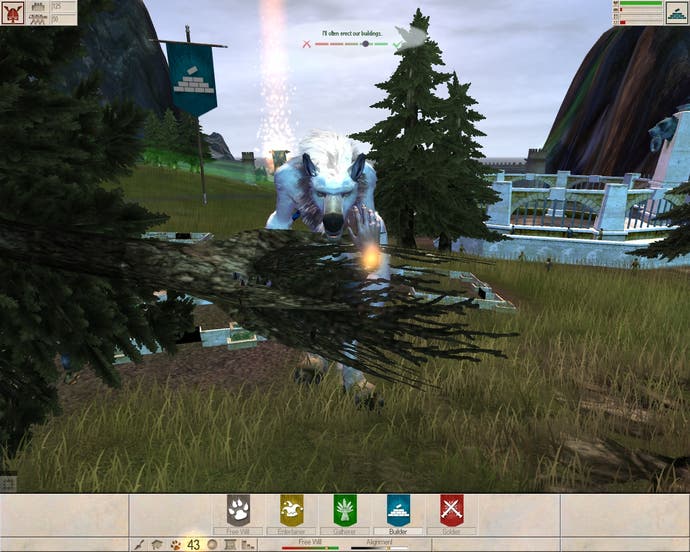
One particularly dreadful example involves catching lambs fired into the air from the apparently pneumatic vagina of a very pregnant sheep. As they come toward you, you're supposed to catch them in your hand. It turned out, clicking pretty much anywhere on the screen, at pretty much any point during their trajectory was enough to count as a catch, and no matter how many were missed, it didn't seem to care. And then after an apparently arbitrary 22 caught lambs, it told me I'd won. It's hard to imagine a less satisfactory victory.
Another is a completely broken game where you're supposed to help a kung-fu student to smash rocks with his fist. Not explaining what you're supposed to do leaves you to fumble about, waggling the mouse until you stumble upon the technique, only to discover that it seemingly only works 50 per cent of the time. Since you have to complete it three times in a row, the broken engine's statistics are against you, and against your even bothering. And anyway, in every other part of the game my powers allow me crack rocks with a mere touch. Why is that suddenly impossible now? Which is to say nothing of the mystery behind the early waterfall-clearing mini-game. There are some rocks blocking the water's flow. But you can't, for some unexplained reason, pick up them up. So you have to clear the fall by, er, picking up some rocks and throwing them at it. Idiotic beyond belief.
Talking of broken, it's time to talk about the combat. Running with the Good/Evil theme, your behaviour defines your alignment, and hence the way you play. Needlessly kill your people, and you're a mean god. Look after them well, and don't drop rocks on their houses, and you're lovely. This also extends to how you go about taking over each island. The angel imp insists that there's no need to go to war, the demon encouraging such violent behaviour enthusiastically. Create an army, and you can march them off to a neutral or enemy town, fight the locals if necessary, and then surround the central hub and take it over. This process is supposed to speed up when there are more men in your army, and when the town's defences are weaker. No evidence of this was apparent. In fact, when one platoon of 75 was reduced to a single solitary soldier by the enemy's Creature, the process continued at the same pace. Enemy platoons appear to work like those battery-driven toy cars you used to get that drove until they hit a wall, turned, and drove off in another direction. Should they stumble upon your army, they might fight it, or they might run about in confused circles. Should there happen to be something so enormously complex as a wall between your army and theirs, then they'll stand there, staring, dreaming crazy AI dreams of what must be on the other side.
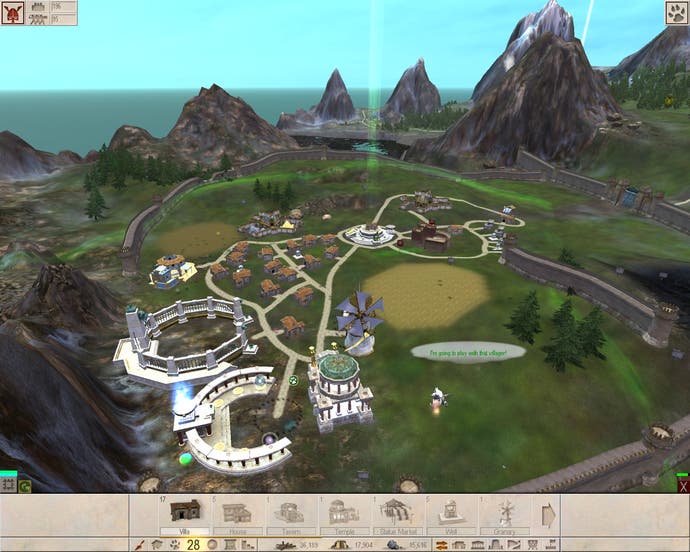
It doesn't get better for your own side. The game informs you, on the spinning signposts that offer titbits of bonus tutorial information in every level (which don't work either - finding their hotspot is an ordeal, then the pop-up text disappears at random while you're reading it), that remnants from battered platoons can be combined. Just drag their flag, hover it over the other platoon, and wait for the 'merge' tooltip to appear. I'm still waiting.
Enough. There's more to complain about, there's more that's broken, incomplete, or flawed. But this has to stop somewhere, and it's already run way over the upper word limit. "Why does it get 6, overly verbose reviewing man? All you've done is complain." Because, trouserless reader, as was explained at the start, these are the reasons why Black & White 2 doesn't get the high score a working version would have achieved. There's a damned fine idea for a game here, and all listed above chronicles the failure to be that game. It reduces it to mediocrity, and it's a sour failure. The way you take over cities doesn't begin to make sense, the supposed ability to capture them by good will is nonsense - you merely gain their citizens, the land remaining neutral until you 'evilly' conquer it - but you do get to capture cities. Your Creature's abilities are not borne of a loving relationship with you, but it is enormously satisfying when he starts pulling trees down to help the people build their houses, or gathers them around him to watch him dance.
Much like Sid Meier's recent reinvention of Pirates!, huge numbers of ideas have been included at the sacrifice of any of them being particularly impressive. Jack of far too many trades, apprentice at only a few. If you're going to include RTS ideas such as the armies, then the sad fact is that these features need to be as good as a straight RTS. Raising your own Creature needs to be as agile and believable as Nintendogs. Building working towns needs to compare to Sim City. Because as unfair as that seems, that's where our expectations begin when we recognise such features in a game. Can't do that? Then make a game you can. Lionhead simply wasn't able to make this one.


